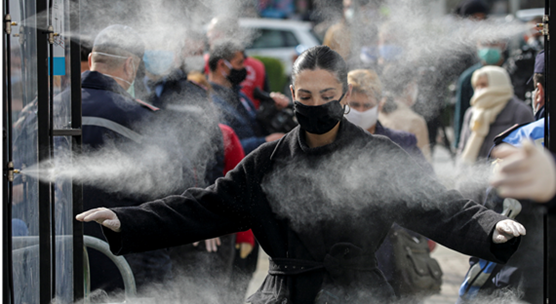
The share of the population infected by COVID-19 in the Balkans has been limited by containment measures (photo: Florion Goga/Reuters/Newscom).
IMF Offers Emergency Support to the Balkans
May 12, 2020
The emerging economies of southeastern Europe that are not part of the European Union, where incomes are lower, and social safety nets less developed, are particularly vulnerable to the economic and social impact of COVID-19. In recent weeks, the IMF has responded with a number of rapidly-disbursing loans to countries in the region.
Related Links
In an interview with IMF Country Focus, Jan Kees Martijn of the IMF’s European Department explains that with the decline in economic activity in the Balkans, large fiscal and external financing gaps have emerged.
In the wake of the COVID-19 pandemic, how does the economic situation differ across countries in the Balkans?
Although the shock of COVID-19 is hitting all countries in the region, there are notable differences in its impact. The share of the population infected by COVID-19 in Balkan countries has been limited by strong containment measures, and so far, has been lower than in many of the more advanced economies.
However, the lockdown of the economies has been costly, as people could not go to work or spend their money. In addition, many households in the region depend on remittances sent home by family members working abroad, whose jobs may be lost due to the crisis. Many governments in the region also depend on funding from abroad, which has become more difficult to mobilize. Also, some countries specialize in activities that have been devastated by the international crisis such as tourism.
In Moldova, the impact of the pandemic is compounded by the economy’s particularly high reliance on remittances, which amounted to nearly 16 percent of GDP last year. Moreover, a third of Moldovans working abroad are temporary migrants, who are often the most vulnerable, also jobwise, in their destination countries. The return of some of those overseas workers further complicated containment efforts.
In Albania, the COVID-19 crisis comes on the heels of a severe earthquake at the end of 2019, and both shocks are expected to depress the country’s important tourism sector. Albania’s strong ties with Italy, where the virus has taken a very heavy toll, further aggravates the crisis.
North Macedonia will see reduced domestic demand but also suffer repercussions from disruption in the European automobile value chain that the country participates in.
In Bosnia and Herzegovina, the crisis response is complicated by its complex political economy, but a prudent fiscal policy in the past created some room for a strong fiscal response.
In the case of Kosovo, flows from the diaspora (tourism receipts and remittances), as well as exports of goods and foreign direct investment, are all expected to plummet due to travel restrictions and the effect of the pandemic on trading partners.
What assistance has the IMF provided?
The IMF was created to help in times like this, and with limited financial buffers, most Balkan countries have requested emergency financing. In early April, the Balkans were among the first to benefit from an IMF decision to double the annual access limits for its rapidly-disbursing loans, which cover urgent financing needs.
On April 10, the IMF Executive Board approved support under the Rapid Financing Instrument (RFI) for Albania, North Macedonia, and Kosovo. They were followed by Moldova on April 17, and by Bosnia and Herzegovina on April 20.
The financial support provides critical resources for governments to shore up the health care sector, and shield jobs and businesses from the crisis. It also limits the decline in international reserves. Unlike the IMF’s standard financial packages, there are no programs attached to these emergency loans.
What is the outlook for growth?
We foresee sizable contractions in economic activity in 2020 for all countries in the region, followed by a gradual and incomplete recovery over the next few years. The full impact of the crisis remains highly uncertain. The growth projections made for the RFIs assumed that the spread of COVID-19 would be contained in the second half of 2020, but it looks increasingly likely that the adverse growth impact may be more severe than was assumed in the RFI requests.
How should policymakers respond to the crisis?
The crisis calls for government policies aimed at mitigating its economic and social impact, and supporting the recovery. In the Balkan countries that have received IMF support through the RFI, the authorities reacted quickly, and put in place stringent containment and mitigation measures to arrest contagion. They ramped up spending on urgent healthcare needs, and introduced support to affected households and businesses. And in Albania, Moldova, and North Macedonia the central bank cut its interest rate to support the economy.
At the same time, the size of the fiscal packages to cushion the impact of the crisis has been smaller in the Balkan countries than in most advanced economies that have more fiscal space. The region’s limited financial buffers could become even more constraining if the crisis turns out to last longer or be more severe than expected. This risk highlights the importance of prudence in reopening the economy to avoid a new surge of the virus. In any case, fiscal support for the people and firms that are hurt by the COVID-19 outbreak should be targeted, temporary, and transparent.
In the coming years, once the shocks have been overcome, countries that have seen a rise in public debt to relatively high levels, including Albania, Kosovo, and North Macedonia, will need to return to steadfast fiscal consolidation in order to rebuild room for fiscal policy maneuver. The IMF stands ready to help countries manage both the near-term challenges and the medium-term recovery.







